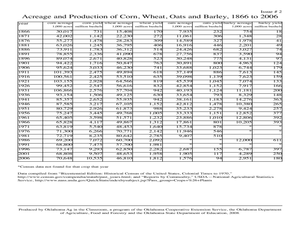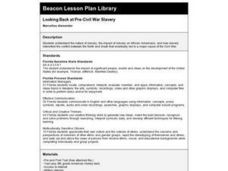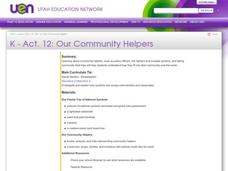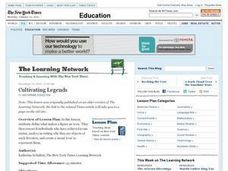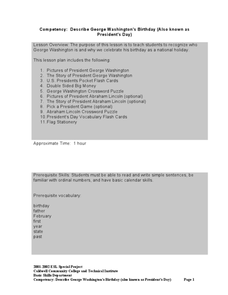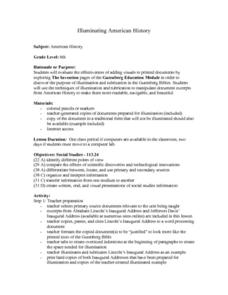Southern Nevada Regional Professional Development Program
Common Core Reading Standards: Understanding Argument
What does your class know about logical fallacies? They can find out quite a bit and practice identifying logical fallacies if you follow the steps and use the resources provided here! After reviewing ethos, pathos, and logos, ask small...
Curated OER
U.S. Penny to Get Four New Designs
Students look at U.S. currency and read about plans to change the back of U.S. pennies. In this current events lesson, the teacher introduces a news article with a discussion of money and a vocabulary activity, then students read the...
National First Ladies' Library
The President's Assassin: Motives and Outcomes
Students investigate the assassinations of four American presidents. Through research, groups create a dossier on one of the four men who were the assassins. After presentations of the dossiers, the class looks for common traits in...
Curated OER
Rules and Responsibilities: Youth and the Process of Change
First graders analyze politics by participating in a class rules lesson. In this democracy lesson, 1st graders identify several class and school rules they dislike and conduct discussions to examine if they should be changed or not....
Curated OER
Americana Trivia Game
In this American history game, students use the blank game board and the trivia question cards to play a board game that tests knowledge of American history. There are 28 trivia questions and full directions.
Curated OER
Arthur Young and the President
High schoolers work with NASS data by converting it into prose. For this historical agriculture information lesson, students read about how George Washington communicated information about crop yields, livestock, and land values. They...
Curated OER
George Washington and the First Census of Agriculture
Sixth graders compare modern agricultural statistics with those that are extracted from a primary source letter of George Washington. They complete worksheets and discuss what they have learned.
Curated OER
Andrew Jackson and the Use of Martial Law and the Suspension of Habeas Corpus
High schoolers explore the use of martial law at the Battle of New Orleans. In this Andrew Jackson lesson, students analyze primary documents pertaining to the move by Jackson to use martial law in the battle. High schoolers then...
National First Ladies' Library
Be Sure To Wash Your Hands!
Students investigate the concept of personal hygiene and its contribution to the prevention of disease. They focus upon the practice of handwashing while conducting research looking for its proven effectiveness. Then students answer some...
Curated OER
Looking Back at Pre-Civil War Slavery
Eighth graders explain the nature of slavery, the impact of slavery on African-Americans, and how slavery intensified the conflict between the North and South that eventually led to a major cause of the Civil War.
Curated OER
Our Community Helpers
Students explore community helpers in order to explain how they fit into their community and the world.
Curated OER
Our Community Helpers
Students identify important aspects of community and culture that strengthen relationships. They discuss pictures of national symbols.
Curated OER
Cultivating Legends
Students research individuals considered to be icons. After reading an article about Sylvia Plath, they create written analyses about them along with visual representations. Students discover the differences between icons and heroes.
Curated OER
Roles of the President
Students read a document which explains the roles and responsibilities of the President of the United States. In groups, they tour the George Bush Presidential Museum and participate in a Presidential scavenger hunt. Once back in the...
Curated OER
Father Knows Best
Learners recognize that history describes events and people of other times and places identifying George Washington by historical account. They describe everyday life in the present and in the past and begin to recognize that things...
Curated OER
Uncle Tom's Cabin
Students analyze the illustrations and cover of the book Uncle Tom's Cabin. For this Uncle Tom's Cabin lesson plan, students discuss the history elements of what they see in the illustrations and cover of the book.
Curated OER
George Washington's Birthday
Students recognize George Washington and why his birthday is celebrated as a national holiday through pictures, a story, crossword puzzles, and other activities involving other presidents.
Curated OER
Illuminating American History
Eighth graders evaluate the effectiveness of adding visuals to printed documents by exploring "The Invention" pages of the "Gutenberg Education Module". They use the techniques of illumination and rubrication to manipulate documents from...
Curated OER
Parallel Lives
Students research the life of an important person in the Civil War on each side who had basically the same responsibilities. They create a timeline based on their lives and present their findings to the class.
Curated OER
George to George
Students use the internet to research the beginnings of the United States government. In groups, they examine the presidency of George Washington while they are guided along a museum tour. They end the lesson by discussing the changes...
South Carolina Educational Television
Know It All: Lesson: Abraham Lincoln
The students will be learning basic facts about Abraham Lincoln while also learning new high-frequency words.
National Endowment for the Humanities
Neh: Edsit Ement: Abraham Lincoln on the American Union: "A Word Fitly Spoken"
In this Curriculum Unit, young scholars will consider "Abraham Lincoln on the American Union:"A Word Fitly Spoken"" in 4 Lessons. The unit also includes worksheets and other student materials that can be found under the resource tab.
PBS
Pbs Learning Media: Looking for Lincoln: Looking for Lincoln Through His Words
In this lesson, students explore how Abraham Lincoln used the power of words in speeches, letters and other documents. Students will use the PBS film Looking for Lincoln, the Gettysburg address, and Lincoln's letters as sources.








